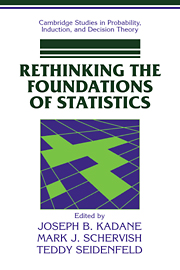Book contents
- Frontmatter
- Contents
- Introduction
- PART 1 DECISION THEORY FOR COOPERATIVE DECISION MAKING
- PART 2 THE TRUTH ABOUT CONSEQUENCES
- PART 3 NON-COOPERATIVE DECISION MAKING, INFERENCE, AND LEARNING WITH SHARED EVIDENCE
- 3.1 Subjective Probability and the Theory of Games
- 3.2 Equilibrium, Common Knowledge, and Optimal Sequential Decisions
- 3.3 A Fair Minimax Theorem for Two-Person (Zero-Sum) Games Involving Finitely Additive Strategies
- 3.4 Randomization in a Bayesian Perspective
- 3.5 Characterization of Externally Bayesian Pooling Operators
- 3.6 An Approach to Consensus and Certainty with Increasing Evidence
- 3.7 Reasoning to a Foregone Conclusion
- 3.8 When Several Bayesians Agree That There Will Be No Reasoning to a Foregone Conclusion
- Index of Names
- Subject Index
3.4 - Randomization in a Bayesian Perspective
Published online by Cambridge University Press: 05 June 2012
- Frontmatter
- Contents
- Introduction
- PART 1 DECISION THEORY FOR COOPERATIVE DECISION MAKING
- PART 2 THE TRUTH ABOUT CONSEQUENCES
- PART 3 NON-COOPERATIVE DECISION MAKING, INFERENCE, AND LEARNING WITH SHARED EVIDENCE
- 3.1 Subjective Probability and the Theory of Games
- 3.2 Equilibrium, Common Knowledge, and Optimal Sequential Decisions
- 3.3 A Fair Minimax Theorem for Two-Person (Zero-Sum) Games Involving Finitely Additive Strategies
- 3.4 Randomization in a Bayesian Perspective
- 3.5 Characterization of Externally Bayesian Pooling Operators
- 3.6 An Approach to Consensus and Certainty with Increasing Evidence
- 3.7 Reasoning to a Foregone Conclusion
- 3.8 When Several Bayesians Agree That There Will Be No Reasoning to a Foregone Conclusion
- Index of Names
- Subject Index
Summary
Applying the theory (of personal probability) naively one quickly comes to the conclusion that randomization is without value for statistics. This conclusion does not sound right; and it is not right. Closer examination of the road to this untenable conclusion does lead to new insights into the role and limitations of randomization but does by no means deprive randomization of its important function in statistics.
L. J. Savage (1961)Though we all feel sure that randomization is an important invention, the theory of subjective probability reminds us that we have not fully understood randomization.… The need for randomization presumably lies in the imperfection of actual people and, perhaps, in the fact that more than one person is ordinarily concerned with an investigation.
L. J. Savage (1962)Randomization has thus been a puzzle for Bayesian theory for many years. In this essay, we give our current views on this subject.
There are two principal arguments for randomization that we are familiar with. The first is to support a randomization-analysis of the data. This notion goes back to Fisher, and is exposited in a series of papers by Kempthorne (1955, 1966, 1977). It asks whether what is observed is surprising given all the other designs that might have been randomly selected and data that might have been observed, but were not. By its appeal to what did not occur, such an analysis violates the likelihood principle; hence, it is not compatible with Bayesian ideas.
- Type
- Chapter
- Information
- Rethinking the Foundations of Statistics , pp. 293 - 313Publisher: Cambridge University PressPrint publication year: 1999
- 2
- Cited by

